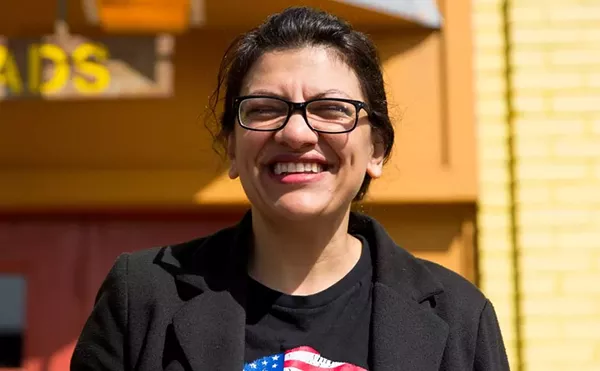Here are four words that, in this particular sequence at least, have never appeared in this space: "Thank you, Kwame Kilpatrick."
And what, you might ask, has the felonious Kwamster done to earn our gratitude?
Actually, it's what he didn't do: Attempt to have the city into purchase the municipal waste incinerator this column has been fixated on for the past few years.
We bring this up now because the full extent of improvements needed at the aging facility were just revealed in documents submitted to the Detroit City Council by the partnership attempting to buy both the waste-to-energy incinerator and Detroit Thermal, the company that operates the steam loop that provides heating and cooling to 144 dowtown buildings.
The incinerator, located near the juncture of interstates 75 and 94, shut down last month after its current owners were unable to reach an agreement on steam sales to Detroit Thermal.
Since the closedown, the city has been shipping its garbage to a landfill. At last week's meeting of the Greater Detroit Resource Recovery Authority, the quasi-public entity that oversees disposal of Detroit's trash, News Hits asked how the cost of landfilling on a temporary basis compares to the $25 per ton the city was paying to have its garbage burned.
John Prymack, GDRRA's director, quickly responded that the price is the same. It's an important point, because the only way Detroit can escape its obligation to send garbage to the incinerator is if the facility's operators fail to meet the best price offered by landfills.
In a memo to the council from David Whitaker, the director of its Research and Analysis Division, an interesting point is raised: "How can the cost of interim landfill disposal be the same as the cost of disposal under firm long-term contracts?"
It would seem that any long-term deal would have to provide a better price than an interim contract. That's how things typically work.
Environmentalists and other activists are now calling on GDRRA to go out and seek new bids from landfill operators, and to determine the costs an overall waste disposal strategy that includes an increased focus on recycling.
Seems like that's a particularly good idea now, given the incinerator's uncertain future.
As Whitaker pointed, "Indeed, with the incinerator facility's ownership and the identity of its operator unclear, how can the cost of incineration be determined at all at this point?"
Especially considering this bombshell: According to the prospective buyers — a partnership between Thermal Ventures II (the parent company of Detroit Thermal) and Atlas Holdings (based in Connecticut) — it will cost more than $48 million to upgrade the facility.
Why so much?
"First, the years of neglect and lack of due care have resulted in a decline in the safety, appearance and odor at the facility," according to the City Council from the prospective owners.
Really? All the while News Hits has been covering this issue, all we've heard from GDRRA is how well-maintained the facility is.
And this is where the thanks to Kwame come in. Had the city bought the place, as some speculated was the plan at one point, it would now be on the hook for all that cash.
Cash the financially strapped city doesn't have.
And, speaking of cash it doesn't have, there is the not-insignificant matter of $28 million in escrow funds being held to help ensure the facility keeps operating until 2021. The money is supposed to buffer Detroit Edison's customers from potential price increases should the plant, which produces electricity as well as steam, shut down.
The Bing administration has been counting on getting about $20 million of that to help reduce this year's projected budget deficit. But, according to a letter from Prymack to Councilmember Ken Cockrel Jr., that isn't happening any time soon.
For the city to get that money, the Michigan Public Service Commission must authorize its release. That's a process that takes as long as six months after an application is submitted.
"Unfortunately," writes Prymack, "we cannot file the application until a variety of negotiations, including several which do not include the authority of the City, are resolved."
There's even more at stake.
The prospective owner — which goes by the name Detroit Renewable Energy — was scheduled to go before the council Tuesday (Nov. 16) to ask for a tax break over the next 12 years to help the company pull off a deal that will involve a total invstment of $90 million.
Among other benefits to the city, according to the partnership, will be the rehiring of more than 130 workers idled because of the plant's shutdown, plus helping secure "hundreds" of indirect jobs. Helping keep the facility open, the partnership contends, will also guarantee the city a secure source of steam for Detroit Thermal, which, the partnership indicates, might have to shut down as well without receiving steam from the incinerator.
That's a concern that's been voiced before. However, Detroit Thermal continues to pump out steam, using clean-burning natural gas at its own facility.
Why couldn't it just continue to do so?
That's yet another unanswered question facing the council as it wrestles with an issue that seems to have no end in sight.






